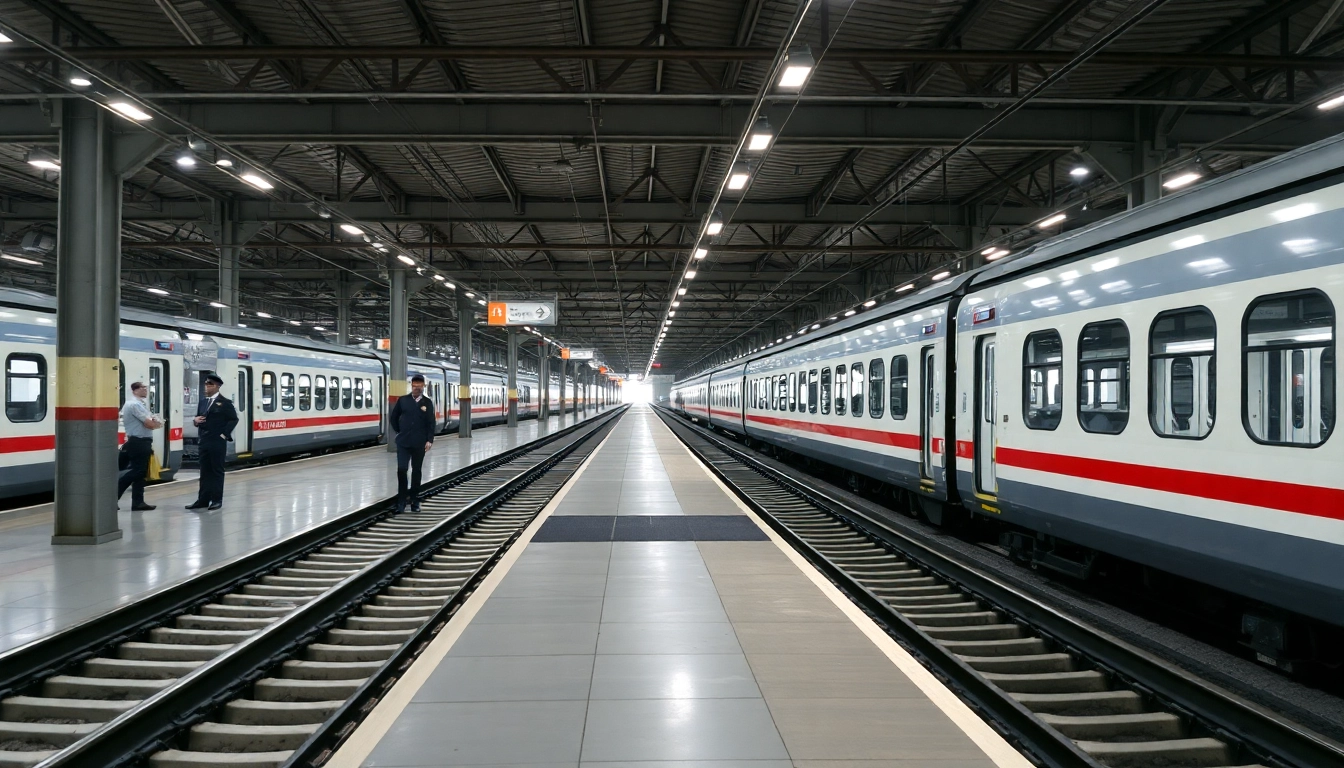Unlocking Railway Jobs in 2025: Opportunities, Preparation Strategies, and Application Insights
Railway employment remains one of the most prestigious and sought-after career options across India. With the dominant role that Indian Railways plays as one of the largest employers in the country, each year witnesses a surge in recruitment drives aimed at filling thousands of vacancies across various zones and departments. In 2025, the railway recruitment landscape continues to grow, offering diverse opportunities for candidates from different educational backgrounds and skill sets. Whether you’re an aspiring engineer, a clerk, a technician, or a supervisor, understanding the latest trends, requirements, and strategies can significantly improve your chances of success in this competitive domain. For detailed updates and application procedures, candidates frequently visit platforms like Railway Jobs to stay ahead in the race for these coveted positions.
Understanding Railway Jobs in 2025: Types and Opportunities
Indian Railways offers a variety of roles, categorized mainly into technical, managerial, and administrative positions. Notable job categories include Group A (All India Services & Class I officers), Group B (Gazetted Non-technical posts), and Group C (Non-Gazetted Technical & Non-Technical roles). Each category encompasses a range of positions such as Civil Engineers, Electrical Engineers, Signal and Telecom Supervisors, Ticket Collectors, Logistics Coordinators, and Customer Support Staff. The recruitment is primarily conducted through Railway Recruitment Boards (RRBs), which oversee zone-specific notifications for zones including Northern, Southern, Western, Eastern, and Central Railways. The diversity of railway jobs ensures opportunities for candidates with varied qualifications, from high school pass-outs to college graduates with professional degrees.
Benefits and Salary Structure of Railway Jobs
One of the major attractions of railway jobs is their comprehensive salary package coupled with extensive benefits. The salary structure is based on the recommendations of the 7th Pay Commission, ensuring attractive pay scales that are regularly revised. Entry-level positions such as Apprentice or Ticket Examiner typically start with a basic pay in the range of ₹20,000 to ₹30,000 per month, including allowances like Dearness Allowance (DA), House Rent Allowance (HRA), and Transport Allowance (TA). As employees gain seniority, promotions and pay hikes lead to substantial growth in salaries, often exceeding ₹60,000 in higher roles.
Additionally, railway employees enjoy benefits including free or subsidized rail travel, medical facilities, pension schemes, housing accommodations, and bonus incentives. These benefits are designed to ensure job stability and work-life balance, which are highly valued in the Indian job market.
Upcoming Railway Recruitment Cycles in 2025
The year 2025 is promising for aspirants seeking railway jobs due to multiple scheduled recruitment drives. The Railway Recruitment Boards (RRBs) plan to release zone-wise notifications covering thousands of posts including Junior Engineer, Senior Engineer, Technician, Group D, and Assistant Loco Pilot (ALP). The RRBs typically initiate recruitment cycles between January and June, with subsequent rounds of exams, skill tests, and medical assessments occurring throughout the year. Staying updated via official RRB websites and trusted platforms like Railway Jobs enables candidates to prepare accordingly and apply within stipulated deadlines.
Eligibility Criteria and Qualification Requirements for Railway Jobs
Educational Qualifications for Different Posts
Eligibility for railway jobs varies significantly depending on the specific role. For entry-level positions such as Ticket Examiners or Clerk posts, candidates typically require at least a 10th or 12th pass. Technical roles like Junior Engineer or Technician demand diplomas or degrees in relevant fields such as Civil, Mechanical, Electrical, or Electronics Engineering. For managerial or supervisory roles, graduation or postgraduate degrees are often mandatory.
Age Limits and Relaxation Policies
The standard age limit for most railway positions ranges from 18 to 33 years. However, there are relaxations for reserved categories, veterans, and differently-abled candidates, often extending the upper age limit by 3 to 10 years based on government policies. Keeping abreast of these relaxations is crucial for devising an effective application strategy.
Additional Eligibility Factors and Certifications
Certifications such as a NCVT/SCVT diploma or specific technical licenses can provide added advantage for specialized roles. Physical fitness, language proficiency, and prior experience (where applicable) further influence eligibility. Government notifications specify detailed criteria, so candidates must carefully evaluate each post’s requirements before applying.
How to Prepare Effectively for Railway Recruitment Exams
Recommended Study Materials and Resources
Successful preparation hinges on selecting the right resources. Candidates should focus on official syllabi and use standard textbooks for sections like General Awareness, Mathematics, General Intelligence & Reasoning, and Technical Subjects. Popular guides and mock test series available on platforms like MockTests.com, Gradeup, and Adda247 enhance practice efficiency. Supplementing studies with current affairs updates from newspapers like The Hindu and PIB ensures constant engagement with contemporary issues.
Exam Pattern and Syllabus Breakdown
The typical railway exam comprises multiple-choice questions divided into sections with varying weightage. For example, the ALP exam includes sections on Arithmetic, General Intelligence, Reasoning, and Technical Ability, each with 20-25 questions. The total duration ranges from 90 to 120 minutes. Understanding the pattern helps in time management, enabling candidates to allocate appropriate time slices to each section.
Tips for Time Management and Mock Tests
Practicing mock tests under live exam conditions sharpens time management skills and boosts confidence. Candidates should develop a strategic approach—scanning questions quickly, prioritizing easier questions, and revisiting challenging ones later. Regular review of results highlights weak areas, guiding focused revisions that enhance overall performance.
Application Process and Important Dates for Railway Jobs
Step-by-Step Application Guidance
The application process is predominantly online. Candidates must visit the official RRB website or trusted portals like Railway Jobs for detailed notifications. The typical steps include registration, filling in personal and academic details, uploading scanned documents, paying the application fee, and submitting the form. Ensuring all information matches official records is vital to avoid disqualification.
Frequently Asked Questions About Railway Recruitment
- Q: How can I stay updated on railway recruitment notices? A: Regularly check the official RRB websites and trusted portals like Railway Jobs.
- Q: What documents are required during application? A: Valid ID proof, educational certificates, passport-sized photographs, and signature scans.
- Q: When are the admit cards released? A: Usually 10-15 days before the exam date, available on official portals for download.
- Q: How are results announced? A: Results are typically published online on the official RRB websites and subsequent merit lists are uploaded for qualified candidates.
Downloading Admit Cards and Checking Results
Admit cards can be downloaded effortlessly from the official RRB portals or the linked resources on Railway Jobs. To check results, candidates need to log in with registration details and roll numbers. Keeping backup copies and verifying details immediately after release can prevent last-minute hassles.
Performance Tips and Success Stories in Railway Exams
Best Practices for Interview and Physical Tests
Once written exams are cleared, physical fitness tests and interviews form the next crucial phase. Candidates should maintain physical health, practice mock interviews, and review their technical knowledge thoroughly. Dressing professionally and confidently presenting your strengths can sway selection panels.
Real Success Stories and Motivation
Many aspirants have transformed their careers by staying dedicated and following structured study plans. For instance, Ramesh from Bihar cracked the ALP exam in 2024 after consistent preparation for a year, eventually securing his dream job in the Southern Railway zone. Such stories exemplify that disciplined efforts yield results.
Common Mistakes to Avoid
- Neglecting official notifications and updates
- Ignoring the detailed syllabus and exam pattern
- Poor time management during mock tests
- Missing deadlines due to slow application processes
- Overlooking physical fitness requirements for certain posts




